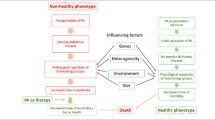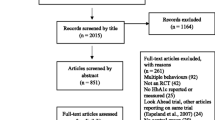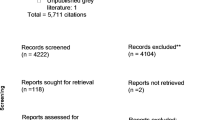Abstract
Purpose
The purposes of this study are to investigate factors influencing non-participation in a structured exercise program for cancer survivors and to explore survivors’ experiences and attitudes in relation to physical activity participation.
Methods
Face-to-face or telephone interviews were conducted with individuals who had registered for, or engaged in, the ‘Life Now’ exercise program run by Cancer Council Western Australia. Participants were 20 cancer survivors (mean age 63.90 years, SD 15.29) who had either cancelled their registration or withdrawn from the exercise program during the preceding 2 years. Interview transcripts were analysed using thematic analysis.
Results
Seven main themes emerged: availability of the program; access, time and cost; lack of motivation or confidence; unwell or fatigued; physical activity preferences; knowledge of physical activity guidelines; and lack of referral or advice. The main barriers were contextual and included availability of, and access to, the program. Participants expressed a preference for home-based physical activity.
Conclusions
Interventions aimed at promoting physical activity in cancer survivors should offer home-based programs and include referral and advice from oncologists.
Implications for cancer survivors
Increasing cancer survivors’ participation in, and compliance with, exercise programs may require home-based strategies and referrals from oncologists to allied health professionals to individualise care.
Similar content being viewed by others
References
Cramp F, Daniel J (2010) Exercise for the management of cancer-related fatigue in adults. Cochrane Database Syst Rev CD006145(2):1–37
Craft LL, Vaniterson EH, Helenowski IB (2012) Exercise effects on depressive symptoms in cancer survivors: a systematic review and meta-analysis. Cancer Epidemiol Biomark Prev 21(1):3–19
Keats MR, Cui Y, Grandy SA, Parker L (2016) Cardiovascular disease and physical activity in adult cancer survivors: a nested retrospective study from the Atlantic PATH cohort. J Cancer Surviv. https://doi.org/10.1007/s11764-016-0584
Friedenreich CM, Neilson H, Farris M et al (2016) Physical activity and cancer outcomes. Clin Cancer Res 22:4766–4775
Baade PD, Frischi L, & Eakin E. Non-cancer mortality among people diagnosed with cancer, Cancer Causes Control 2006;17(3):287–297
Doyle C, Kushi L, Byers T, Courneya KS, Demark-Wahnefried W, Grant B (2006) Nutrition and physical during and after cancer treatment: an American Cancer Society guide for informed choices. CA Cancer J Clin 55(6):323–353
Rock CL, Doyle C, Demark-Wahnefried W, Meyerhardt J, Courneya KS, Schwartz AL et al (2012) Nutrition and physical activity guidelines for cancer survivors. CA Cancer J Clin 62:242–274
Eakin EG, Youlden DR, Baade PD, Lawler SP, Reeves MM, Heyworth JS (2006) Health status of long-term cancer survivors: results from an Australian population-based sample. Cancer Epidemiol Biomark Prev 15(10):1969–1976
Underwood JM, Townsend JS, Stewart SL, Buchannan N (2012) Surveillance of demographic and health behaviours among adult cancer survivors- behavioural risk factors surveillance system, United States, 2009. Surveillance Summ 61(SS01):1–23
Leach CR, Weaver KE, Aziz NM, Alfano CM, Rowland JH (2015) The complex health profile of long-term cancer survivors: prevalence and prediction of comorbid conditions. J Cancer Surviv. https://doi.org/10.1007/511764-014-04.3-1
Peeters C, Stewart A, Segal R, Wouterloot E, Scott CG, Aubry T (2009) Evaluation of a cancer program: patient and physician beliefs. Psycho-Oncology 18(8):898–902
Beehler GP, Rodrigues AE, Kay MA, Kiviniemi MT, Steinbrenner L (2014) Perceptions of barriers and facilitators to health behaviour change among veteran cancer survivors. Mil Med 179(9):998–1005
Blaney JM, Lowe-Strong A, Rankin-Watt J, Campbell A, Gracey JH (2013) Cancer survivors’ exercise barriers, facilitators and preferences in the context of fatigue, quality of life and physical activity participation: a questionnaire-survey. Psycho-Oncology 22(1):186–194. https://doi.org/10.1002/pon.2072
Courneya KS, Friedenreich CM, Quinney HA, Fields ALA, Jones LW, Vallance JKH, Fairey AS (2005) A longitudinal study of exercise barriers in colorectal cancer survivors participating in a randomized controlled trial. Ann Behav Med 29(2):147–153
Ottenbacher AJ, Day RS, Taylor WC, Sharma SV, Sloane R, Snyder DC, Kraus WE, Demark-Wahnefried W (2011) Exercise among breast and prostate cancer survivors—what are their barriers? J Cancer Surviv 5(4):413–419. https://doi.org/10.1007/s11764-011-0184-8
Rogers LQ, Courneya KS, Shah P, Dunnington G, Hopkins-Price P (2007) Exercise stage of change, barriers, expectations, values and preferences among breast cancer patients during treatment: a pilot study. Eur J Cancer Care 16:55–66. https://doi.org/10.1111/j.1365-2354.2006.00705.x
Hardcastle SJ, Maxwell-Smith C, Zeps N, Platell C, O’Connor M, Hagger MS (2016) A qualitative study exploring health perceptions and factors influencing participation in health behaviors in colorectal cancer survivors. Psycho-Oncology. https://doi.org/10.1002/pon.4111
Jones LW, Courneya KS (2002) Exercise counselling and programming preferences of cancer survivors. Cancer Pract 10(4):208–215
Fisher A, Wardle J, Beeken RJ, Croker H, Williams K, Grimmett C (2016) Perceived barriers and benefits to physical activity in colorectal cancer patients. Support Care Cancer 24(2):903–910. https://doi.org/10.1007/s00520-015-2860-0
Hefferon K, Murphy H, McLeod J, Mutrie N, Campbell A (2013) Understanding barriers to exercise implementation 5-years post-breast cancer diagnosis: a large scale qualitative study. Health Ed Res 28(5):843–856
Hardcastle SJ, Glassey R, Tan J, Cohen P (2016) Factors influencing participation in health behaviours in endometrial cancer survivors. Psycho-Oncology. https://doi.org/10.1002/pon.4288
Tong A, Sainsbury P, Craig J (2007) Consolidated criteria for reporting qualitative research (COREQ): a 32-item checklist for interviews and focus groups. Int J Qual Health Care 19(6):349–357
Maxwell-Smith C, Zeps N, Hagger MS, Platell C, Hardcastle SJ (2016) Barriers to physical activity participation in colorectal cancer survivors. Psycho-Oncology. https://doi.org/10.1002/pon.4234
Sparkes AC, Smith B (2014) Qualitative research methods in sport, exercise and health. Routledge, London
Braun V, Clarke V (2006) Using thematic analysis in psychology. Qual Res Psychol 3:77–101. https://doi.org/10.1191/1478088706qp063oa
Hardcastle SJ, Hagger MS (2011) “You can't do it on your own”: experiences of a motivational interviewing intervention on physical activity and dietary behaviour. Psychol Sport Exerc 12:314–323
Hardcastle SJ, Hagger MS (2016) Psychographic profiling for effective health behaviour change interventions. Front Psychol. https://doi.org/10.3389/fpsyg.2015.01988
McGowan EL, Speed-Andrews AE, Blanchard CM, Rhodes RE (2013) Friedenreich CM…Kourneya KS. Physical activity preferences among a population-based sample of colorectal cancer survivors. Oncol Nurs Forum 40(1):44–52
Rogers LQ, Markwell SJ, Verhulst S, McAuley E, Courneya KS (2009) Rural breast cancer survivors: exercise preferences and their determinants. Psycho-Oncology 18(4):412–421
Stevinson C, Capstick V, Schepansky A, Tonkin K, Vallance J et al (2009) Physical activity preferences of ovarian cancer survivors. Psycho-Oncology 18(4):222–228
World Health Organization (2012) Health education: Theoretical concepts, effective strategies and core competencies. Cairo 1–82. https://doi.org/10.1177/1524839914538045
Fisher A, Williams K, Beeken R, Wardle J (2015) Recall of physical activity advice was associated with higher levels of physical activity in colorectal cancer patients. BMJ Open 5. https://doi.org/10.1136/bmjopen-2014-006853
Karvinen KH, DuBose KD, Carney B (2010) Promotion of physical activity amongst oncologists in the US. J Support Oncol 8:35–41
Hardcastle SJ, Cohen PA (2017) Effective physical activity promotion to cancer survivors is likely to be home-based and to require oncologist participation. J Clin Oncol JCO2017746032. https://doi.org/10.1200/JCO.2017.74.6032
Wahnefried W, Jones LW (2008) Promoting a healthy lifestyle among cancer survivors. Hematol Oncol Clin North Am 22:319–342
Mishra SI, Scherer RW, Geigle PM, Berlanstein DR, Snyder C (2012) Exercise interventions on health-related quality of life for cancer survivors. Cochrane Database Syst Rev 8:CD007566
Hamlin MJ, Yule E, Elliott CA, Stoner L, Kathiravel Y (2016) Long-term effects of a New Zealand green prescription program in primary health care exercise initiative. Public Health 140:102–108
Garrett S, Elley CR, Rose SB, O’Dea D, Lawton BA, Dowell AC (2011) Are physical activity interventions in primary care and the community cost-effective? A systematic review of the evidence. Br J Gen Prac 61(584):e125–e133
Department of Health (2009) The General Practitioner Physical Activity Questionnaire: a screening tool to assess physical activity levels, within Primary care. DOH, London
Author information
Authors and Affiliations
Corresponding author
Ethics declarations
Conflict of interest
The authors declare that they have no conflict of interest.
Electronic supplementary material
ESM 1
(DOCX 14 kb).
Rights and permissions
About this article
Cite this article
Hardcastle, S.J., Maxwell-Smith, C., Kamarova, S. et al. Factors influencing non-participation in an exercise program and attitudes towards physical activity amongst cancer survivors. Support Care Cancer 26, 1289–1295 (2018). https://doi.org/10.1007/s00520-017-3952-9
Received:
Accepted:
Published:
Issue Date:
DOI: https://doi.org/10.1007/s00520-017-3952-9




